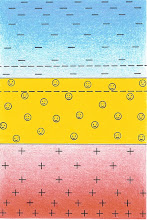Friday, May 25, 2012
Rare Genetic Mutations Are Linked to Common Diseases
A recent New York Times article indicates that common human diseases such as cancer and psychiatric disorders are caused by a combination of rare genetic mutations. This is different from the "common disease, common variant" viewpoint that has guided previous research. It is easier to look for common genetic mutations than rare ones. This has proved to be a fruitless search. "Common variants have turned out to explain only a fraction of the genetic risk of common disease." The challenge for future research is that rare mutations are difficult to find, and require large sample sizes. Also, different races of people (e.g. Africans versus Europeans) will likely have different mutations. The bottom line is that we're a long way from understanding the genetic causes of psychiatric disorders such as depression, autism, or schizophrenia.
Pseudo Research Links Vaccines to Health Problems
A friend sent me a link to a website that spoke of a study that supposedly proves that vaccinated children are more prone to allergies and other health problems than unvaccinated children. This study, known as the Bachmair vaccination study,was not published in a peer-reviewed journal. It compares data drawn from an online survey to data from a different scientific survey of German children and adolescents. The online survey was taken from visitors to an anti-vaccine website. This supposed study includes no methods section and no statistical analysis. Online surveys are notoriously biased and unscientific. An online survey of visitors to an anti-vaccine website will be expected to have results that support an anti-vaccine viewpoint. Vaccines have saved millions of children from the ravages of communicable diseases. Perhaps vaccinated children do actually have more allergies, herpes, seizures, and migraines than unvaccinated children, as this study suggests, but it offers no proof. This pseudo research emphasizes the need for parents and concerned citizens to be critical readers of Internet sites.
Subscribe to:
Posts (Atom)
